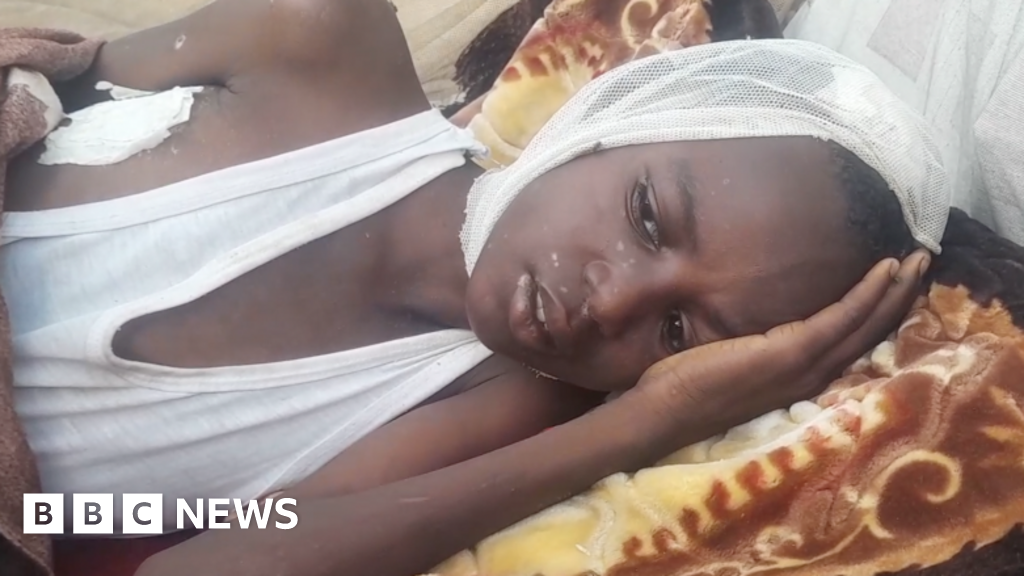Sudanese city under siege: 'My son's whole body is full of shrnel'

Sudan: El-Fasher Civilians Trapped as RSF Closes In
The Sudanese city of El-Fasher, the army's last major stronghold in the Darfur region, is facing a dire humanitarian crisis as the paramilitary Rapid Support Forces (RSF) tighten their siege. Tens of thousands of civilians are trapped, enduring relentless shelling, dwindling supplies, and collapsing medical services.
Civilians Bear the Brunt of Fighting
Ahmed Abdul Rahman, a 13-year-old boy sheltering in a makeshift camp, is one of the many victims of the escalating conflict. "I feel pain in my head and my legs," he says, after being injured in a recent shelling. His mother, Islam Abdullah, describes his condition as "unstable," highlighting the scarcity of medical care as hospitals are targeted and resources depleted.
The BBC has worked with freelance journalists on the ground to document the harrowing experiences of those trapped in El-Fasher. Hamida Adam Ali, another civilian injured by shell fire, lay on the road for five days before being rescued. "I don't know if my husband is dead or alive," she says, adding that her children are starving. "My leg is rotting – it smells foul now. I am just lying down. I have nothing."
RSF Advances and Strategic Implications
The RSF has made significant territorial gains in recent weeks, releasing footage purportedly showing their fighters at the headquarters of the military's armored corps. While the Sudanese army claims to be defending remaining bases and receiving supplies via airdrops, the RSF portrays itself as on the verge of victory.
Sudanese analyst Kholood Khair explains that seizing El-Fasher would provide the RSF with a crucial strategic advantage. "The RSF would be able to bring in more fuel from southern Libya, more weapons, also from southern Libya, and would be able to safeguard their transit from the border region all the way into Darfur," she told the BBC. "And from El-Fasher, the RSF would be able to launch attacks into both the Kordofan regions and into the capital [Khartoum] again. And so, it would really position the RSF much more strongly militarily."
A Fight for Survival
Local armed groups known as the Joint Forces are fighting alongside the army in El-Fasher. According to Ms. Khair, their motives are deeply rooted in the region's dynamics. "For the Joint Forces, this is a fight for their homelands," she says. "This is a fight for their ability as armed groups to claim constituencies in Darfur. If they lose Darfur, they effectively no longer have a claim to any part of Darfur… It's a fight for their political survival."
Accusations of External Support and War Crimes
The RSF's advance has been fueled by increasingly sophisticated drones, allegedly supplied by the United Arab Emirates (UAE). While the UAE denies these allegations, reports from war monitors, including UN experts, suggest otherwise. Footage verified by the BBC shows drones hitting locations near military sites, as well as civilian areas, including markets.
Last month, a strike on a mosque during morning prayers resulted in the deaths of more than 75 people. While the RSF did not publicly claim responsibility, they are widely blamed for the attack. The UN and human rights groups have presented evidence of war crimes committed by the paramilitary group, including the targeting of non-Arab ethnic groups like the Zaghawa community.
Fear and Uncertainty
Hundreds of thousands have fled El-Fasher in the past year, with reports of attacks, robberies, and killings along the escape routes. The UN warns of potential atrocities if the RSF overruns the city. Despite the RSF's attempts to portray a more benign image through videos showing them assisting fleeing civilians, many remain deeply skeptical.
One refugee watching the videos from outside Sudan recognized people he knew being stopped by RSF fighters, including relatives. "It really devastated and shocked me," he told the BBC, requesting anonymity to protect his family. Later, he confirmed his relatives were safe, but his relief was tempered by the ongoing suffering of his community. "It's not just my relatives," he said. "It's about all the people that I know. It's about my memories there. I see every day, people whom I know die, places that I used to go to destroyed. My memories died, not just the people that I know. It's like a nightmare."
Historical and Current Context
The conflict in Sudan erupted in April 2023, stemming from a power struggle between the leaders of the RSF and the Sudanese army. The RSF, originally formed from the Janjaweed militias implicated in the Darfur genocide of the early 2000s, has expanded its influence in recent years. The current fighting has exacerbated existing ethnic tensions and created a humanitarian catastrophe, displacing millions and pushing the country towards famine.
As the siege of El-Fasher continues, the fate of the trapped civilians hangs in the balance. Many fear what the coming weeks will bring, left with little more than the hope of survival.
Originally sourced from: BBC News Africa
